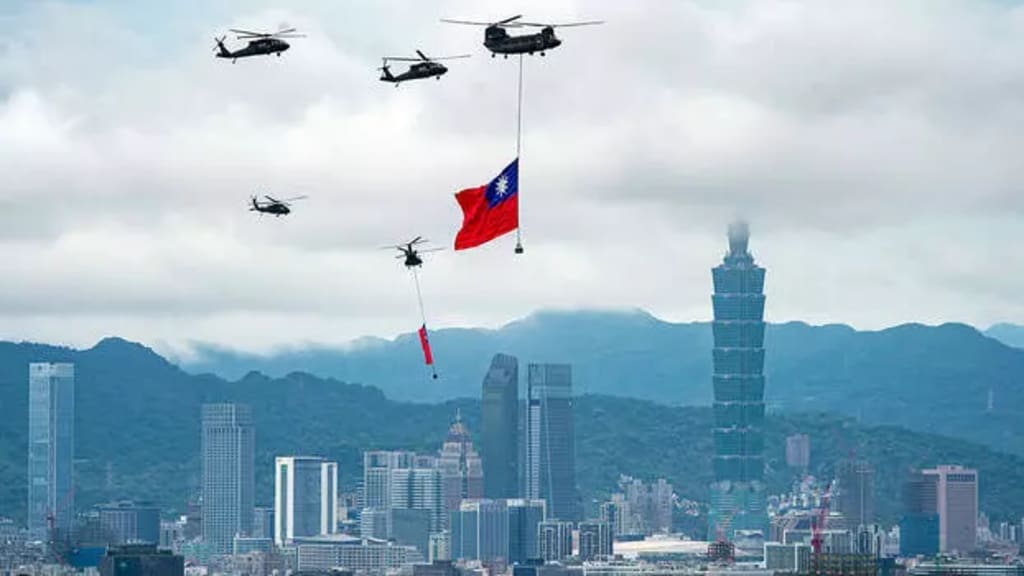Potential Consequences of a Chinese Invasion of Taiwan: A Comprehensive Analysis
by David Pieringer

Potential Consequences of a Chinese Invasion of Taiwan: A Comprehensive Analysis
Introduction
The prospect of China invading Taiwan is a scenario that carries profound implications for regional and global stability. This article explores the potential consequences of such an invasion from multiple perspectives, including geopolitical, economic, and humanitarian impacts. It also examines the responses from key global players, particularly the United States and its allies, and the broader international community.
Historical Context
Taiwan, officially known as the Republic of China (ROC), has a complex and contested status. After the Chinese Civil War, the defeated Kuomintang (KMT) retreated to Taiwan in 1949, while the Communist Party established the People's Republic of China (PRC) on the mainland. Since then, Taiwan has maintained a separate government, but Beijing considers it a renegade province that must be reunified with the mainland, by force if necessary.
Geopolitical Implications
Regional Stability
An invasion of Taiwan by China would drastically alter the balance of power in East Asia. It would likely lead to significant instability, with potential military confrontations involving neighboring countries such as Japan and South Korea. The region's security dynamics would be fundamentally reshaped, triggering a re-evaluation of defense strategies and alliances.
US-China Relations
The United States has a long-standing commitment to Taiwan under the Taiwan Relations Act, which mandates that the US provide Taiwan with the means to defend itself. An invasion would test this commitment and could lead to direct military confrontation between the US and China. The implications of such a conflict would extend globally, potentially drawing in other NATO allies and reshaping global alliances.
International Reactions
The international community's response would vary, but a majority of countries would likely condemn the invasion, leading to widespread diplomatic fallout for China. Sanctions and other punitive measures could be imposed by Western nations, significantly affecting China's global standing and economic relationships.
Economic Consequences
Global Supply Chains
Taiwan is a crucial player in global supply chains, particularly in the semiconductor industry. An invasion and subsequent conflict would disrupt these supply chains, leading to shortages of critical components for electronics, automotive, and other industries. The economic ripple effects would be felt worldwide, causing significant disruptions in production and innovation.
Economic Sanctions
In response to an invasion, Western countries would likely impose severe economic sanctions on China. These sanctions could target key sectors such as technology, finance, and energy, leading to a significant slowdown in the Chinese economy. Global markets would experience volatility, with potential recessions in economies heavily linked to China.
Trade Routes
The Taiwan Strait is one of the world's busiest shipping lanes. A conflict in this region would disrupt maritime trade routes, affecting global trade flows and increasing shipping costs. The impact on international trade would be profound, with longer shipping times and higher prices for goods.
Humanitarian Impact
Civilian Casualties and Displacement
A military invasion would result in significant civilian casualties and displacement. Taiwan's population of over 23 million would be at risk, with many likely to seek refuge in neighboring countries. The humanitarian crisis would strain resources and capabilities of these countries, requiring substantial international aid and support.
Infrastructure Damage
The conflict would likely result in extensive damage to Taiwan's infrastructure, including residential areas, industrial facilities, and critical infrastructure like power and water supplies. Rebuilding efforts would be monumental, requiring significant time and investment.
Responses from Key Global Players
United States
The US response would be crucial in shaping the conflict's outcome. Potential responses could range from diplomatic pressure and economic sanctions to direct military intervention. The US might also increase its support for Taiwan's defense through arms sales and intelligence sharing. The strategic ambiguity policy of the US regarding Taiwan would be put to the test, potentially leading to a more explicit commitment to Taiwan's defense.
Japan and South Korea
As key US allies in the region, Japan and South Korea would likely play significant roles. Japan, in particular, has expressed increasing concern over China's actions in the region and might provide logistical and possibly military support to Taiwan. South Korea's response would be more cautious, given its proximity to China and the North Korean threat, but it would still align closely with US and allied actions.
European Union
The EU would likely condemn the invasion and impose its own set of sanctions on China. While direct military involvement is unlikely, the EU would support diplomatic efforts to resolve the conflict and provide humanitarian aid to those affected.
ASEAN
Southeast Asian nations, grouped under ASEAN, would be deeply concerned about the regional instability caused by the conflict. Their responses would vary, with some countries taking a neutral stance to avoid antagonizing China, while others might support international efforts to condemn the invasion and provide humanitarian assistance.
Long-Term Strategic Implications
Military Buildup and Arms Race
A Chinese invasion of Taiwan would likely trigger a significant military buildup in the region, with neighboring countries increasing their defense budgets and modernizing their armed forces. This arms race could lead to further regional instability and increased risk of military confrontations.
Shift in Global Alliances
The conflict would likely result in a realignment of global alliances. Countries in the Asia-Pacific region might seek closer ties with the US and its allies to counterbalance China's influence. Conversely, China might deepen its partnerships with countries that are either neutral or supportive of its actions, such as Russia and certain African and Middle Eastern nations.
Influence on International Norms
The invasion would challenge international norms related to sovereignty and the use of force. It would set a precedent for other territorial disputes, potentially encouraging similar actions by other countries. The international community would need to address the erosion of these norms to prevent further conflicts.
Conclusion
A Chinese invasion of Taiwan would have far-reaching consequences, affecting geopolitical stability, economic conditions, and humanitarian situations globally. The responses from key global players, particularly the United States and its allies, would shape the conflict's trajectory and its long-term implications. The international community would face the challenge of addressing the immediate crisis while working to prevent future conflicts and maintaining the principles of sovereignty and international law.
About the Creator
David Pieringer
Welcome to my page! I'm a dedicated writer and student with a passion for both education and sports. Balancing my love for learning with my athletic pursuits, I strive to excel in everything I do.
Enjoyed the story? Support the Creator.
Subscribe for free to receive all their stories in your feed. You could also pledge your support or give them a one-off tip, letting them know you appreciate their work.






Comments
There are no comments for this story
Be the first to respond and start the conversation.